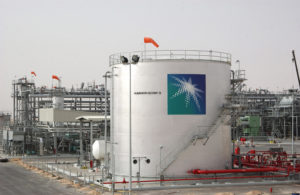by WorldTribune Staff, August 11, 2016
Saudi Arabia continues to pump oil at record levels as U.S. shale producers prepare to cut back amid seasonal maintenance at American refineries.
Saudi has said it will not agree on limitations on production unless all OPEC nations, including Iran, agree.

Iran, which has resumed production faster than expected after the lifting of international sanctions, has refused to limit its output.
Iranian Oil Minister Bijan Namdar Zanganeh told state-run Fars News Agency on Aug. 10 that Iran’s oil production was at 3.85 million barrels a day, according to wire reports. The U.S. Energy Information Administration had estimated that Iran would not be back to that level until 2017.
U.S. refineries reduce their need for crude oil between late August and October as they switch over to produce winter blends.
Analysts mostly expect oil to rally after the end of U.S. refining maintenance, but they disagree on how much oil could drop in the interim. WTI futures closed at $41.71 per barrel on Aug. 10, down 2.5 percent.
“There’s some key technical numbers right around $35, and I think that’s what we’re going to consider before we can have a more constructive outlook,” said John Kilduff, partner with Again Capital. He said the trough could come right around the time of the energy conference where OPEC plans to meet — Sept. 26-28.
“Prices will be low again, likely below $40, and the glut is going to be apparent to everyone. … I think they’re going to be hysterical going into the OPEC meeting. They’re going to have to do something,” he said.
OPEC suggested this week that it would hold an informal meeting on the sidelines of an Algerian energy conference in late September.
“I’m skeptical that we’re going to see anything out of OPEC. I don’t see anything out of Saudi. Their silence is rather telling,” said Greg Priddy, director of global energy with Eurasia Group.
Meanwhile, Venezuelan President Nicolas Maduro said he spoke to Saudi Arabia’s king and is reaching out to the heads of state of other producing nations about boosting oil prices. Maduro said OPEC should try to return oil prices to the $70 per barrel level, according to wire reports.
“He just came across as very desperate,” said Priddy.
